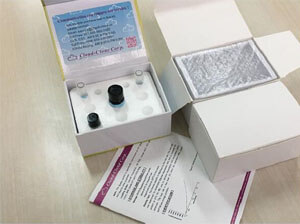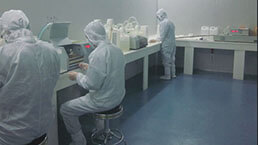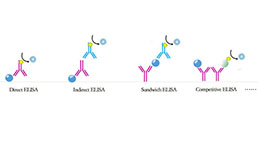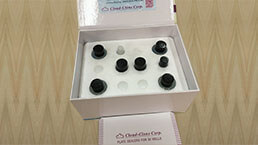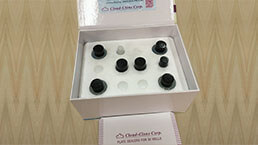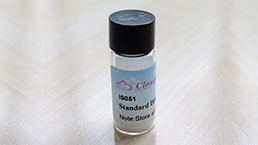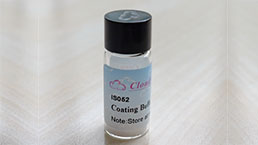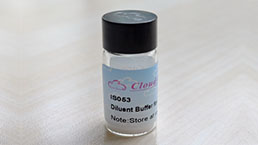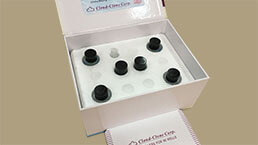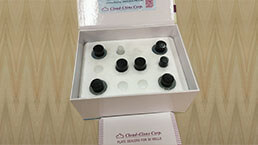ELISA Kit DIY Materials for Surfactant Protein B (SP-B) 

SFTPB; PSPB; SFTB3; SFTP3; SPB; Surfactant Associated Protein B; Pulmonary Surfactant Protein B; 18 kDa pulmonary-surfactant protein; 6 kDa protein
- UOM
- FOB US$ 1,300.00 US$ 2,166.00 US$ 3,899.00 US$ 7,581.00 US$ 12,996.00
- Quantity
Overview
Properties
- Product No.KSB622Ra01
- Organism SpeciesRattus norvegicus (Rat) Same name, Different species.
- ApplicationsMain materials for "Do It (ELISA Kit) Yourself".
Research use only - Downloadn/a
- CategoryTumor immunityInfection immunityPulmonology
- Reagent Contents Capture Antibody, Detection Antibody, Standard, Streptavidin-HRP, TMB Substrate, 96-well Plate
- Detectable SampleTissue homogenates, cell lysates, lung lavage fluid and other biological fluids.
- Applicable PrincipleDouble-antibody Sandwich ELISA for Antigen Detection
- Detectable Range0.156-10ng/mL
- Applicable Sensitivity0.054ng/mL
Sign into your account
Share a new citation as an author
Upload your experimental result
Review

Contact us
Please fill in the blank.
Specifity
The Abs in the kit have high sensitivity and excellent specificity for detection of Surfactant Associated Protein B (SPB). No significant cross-reactivity or interference between Surfactant Associated Protein B (SPB) and analogues was observed.
Usage
1. Coat the plates with 100μL per well of working solution of Capture Antibody.incubate overnight at 4°C or incubate at 37°C for 2 hours.
2. Aspirate and wash 1 time.
3. Block the plates with 200 μL per well of working solution of Blocking Buffer. Incubate at 37°C for 1.5 hours.
4. Aspirate and wash 1 time. The plates are now ready for sample detection, the protocol is the same as regular ELISA.
Storage
Antibodies, Standard and Streptavidin-HRP should be stored at -20°C. TMB should be stored at 4°C. 96-well Plate could be stored at room temperature. The contents are valid for twelve months. They are stable for one month after opening when stored at 4°C.
Support pack
Giveaways
Increment services
Citations
- Kinetics of plasma SPB and RAGE during mechanical ventilation in patients undergoing major vascular surgeryPubMed: 21736957
- Detection of surfactant proteins A, B, C, and D in human nasal mucosa and their regulation in chronic rhinosinusitis with polypsPubMed: 23406594
- Surfactant protein B and RAGE increases in the plasma during cardiopulmonary bypass: a pilot studyPubMed: 20650982
- Staphylococcus aureus and Pseudomonas aeruginosa Express and Secrete Human Surfactant ProteinsPubMed: PMC3551896
- The Detection of Surfactant Proteins A, B, C and D in the Human Brain and Their Regulation in Cerebral Infarction, Autoimmune Conditions and Infections of the CNSPubMed: PMC3787032
- Lung Cancer Signatures in Plasma Based on Proteome Profiling of Mouse Tumor ModelsPubMed: PMC3406925
- Acute high-altitude exposure reduces lung diffusion: Data from the HIGHCARE Alps projectPubmed: 23619193
- Surfactant-Derived Proteins as Markers of Alveolar Membrane Damage in Heart FailurePubmed:25514679
- Nachweis und Charakterisierung des Oberfl?chenproteins PLUNC (Palate, Lung and Nasal Clone Protein) an der Augenoberfl?che und Bedeutung für das Trockene AugeOpus4:Source
- Plasma immature form of surfactant protein type B correlates with prognosis in patients with chronic heart failure. A pilot single-center prospective studyPubMed: 26310985
- Serum Levels of Surfactant Proteins in Patients with Combined Pulmonary Fibrosis and Emphysema (CPFE)Pubmed:27337142
- The Cerebral Surfactant System and Its Alteration in HydrocephalicConditions.pubmed:27656877
- Correlations of Ventricular Enlargement with Rheologically Active SurfactantProteins in Cerebrospinal Fluid.pubmed:28101052
- Correlations of Ventricular Enlargement with Rheologically Active Surfactant Proteins in Cerebrospinal FluidPMC5209370
- Diving and pulmonary physiology: surfactant binding protein, lung fluid and cardiopulmonary test changes in professional diverspubmed:28467885
- Surfactant Protein B Suppresses Lung Cancer Progression by Inhibiting Secretory Phospholipase A2 Activity and Arachidonic Acid Productionpubmed:28743125
- Chronic lung injury and impaired pulmonary function in a mouse model of acid ceramidase deficiency.pubmed:29167126
- Effects and molecular mechanisms of intrauterine infection/inflammation on lung developmentPubmed:29747649
- Surfactant proteins changes after acute hemodynamic improvement in patients with advanced chronic heart failure treated with LevosimendanPubmed:29548887
- Serum Surfactant Protein Levels in Patients Admitted to the Hospital with Acute COPD ExacerbationPubmed:29445934
- Generation of an alveolar epithelial type II cell line from induced pluripotent stem cellsPubmed: 30211653
- Culture of human alveolar epithelial type II cells by sproutingPubmed: 30340591




